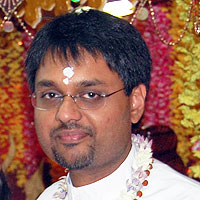“Guru pad pankaj seva teesri bhakti amaan – The third type of devotion is selfless service to the guru’s lotus feet without any desire or pride.” These words of the Lord Shri Raam to Shavari in Shri Raamcharitramanas show clearly the significant role of the spiritual teacher in the life of the spiritual aspirant. Indeed, according to the tenets of Sanaatan Dharma, the guru’s role is most substantial, often acting as the intermediary between the soul and the Supreme. The Guru Gita aptly describes the guru as “dispeller of darkness” (from ‘gu’, darkness and ‘ru’, that which dispels). He is one who, in his attainment of self mastery, has realized his identity with the omnipresent Spirit. Such a one is uniquely qualified to lead the seeker on his or her inward journey toward perfection.
Hindu scriptures regard the guru along with the mother and the father as the most venerable teacher of an individual. The maxim, ‘Aachaarya Devo Bhavah – The teacher is God’, speaks volumes of the necessity of the guru in one’s life.
In Bhagavad Gita, Bhagavan Krishna speaks to Arjuna of the importance of finding a guru. He says: “Acquire the transcendental knowledge from a Self-realised master by humble reverence, by sincere inquiry and by service. The wise ones who have realised the Truth will impart the Knowledge to you.”
The ‘guru-shishya’ tradition is one that focuses on the transmission of teachings from a guru to a ‘shishya’ (disciple). In this relationship, subtle and advanced knowledge is conveyed and received through the student’s respect, commitment, devotion and obedience. The spiritual teacher beholds God’s presence in everyone and guides the shishya on the road of self realisation. He prescribes the ‘saadhan’ or spiritual discipline and instructs the student in the use of the ‘mantra’ (sacred formula) to assist in his meditation and in the journey towards attaining his ‘saadhya’ or goal. This goal, the ultimate one in man’s purpose on earth, is the attainment of the state of self realisation.The conscientious student eventually masters the knowledge that the guru embodies. The example of the guru who, though human, has achieved spiritual enlightenment, leads the devotee to discover the same potentialities within himself. He is a living embodiment of scriptural truth. Without doubt, the real way to freedom lies in following one who has traversed the forest of the world process and can lead one safely to God.
Speaking of his guru, Paramahansa Yogananda said, “Only he who knows God can show others how to know Him. When I found such a one, my Guru Swami Sri Yukteswarji, I realized that God doesn’t teach through mystery, but through illumined souls. God is invisible but He becomes visible through the intelligence and spiritual perception of one who is in constant communion with Him. There may be many teachers in one’s life, but there is only one Guru.”
About the importance of the guru, Swami Vivekananda says: “This insufficiency of books to quicken spiritual growth is the reason why, although almost every one of us can speak most wonderfully on spiritual matters, when it comes to action and the living of a truly spiritual life, we find ourselves so awfully deficient. To quicken the spirit, the impulse must come from another soul. The person from whose soul such impulse comes is called the Guru – the teacher and the person to whom the impulse is conveyed is called the shishya – the student.”
As Hindus observe the auspicious occasion of Guru Poornima on July 12, it is hoped that all shishyas reflect on the importance of their gurus on their own development and express their gratitude to them.


